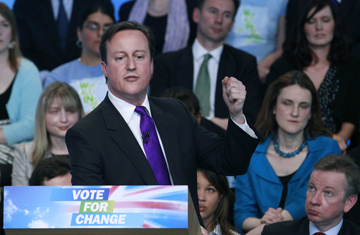
Conservative leader David Cameron speaks at the launch of the Conservative Party manifesto in London on April 13, 2010
An election is the battle for the soul of a country, and party spin doctors are busily concocting competing visions of Britain to lure voters to the polls on May 6. The stakes are high. The Conservatives' lead in opinion polls is too narrow to guarantee an outright victory, and that might allow the Labour government to hang on by the skin of its teeth (Britain's electoral system favors incumbents), or it could result in a hung parliament, with Liberal Democrats and other smaller parties holding the balance of power.
So on to those different visions of Britain. On Tuesday, Conservative leader David Cameron presented his party's manifesto in a derelict power station festooned with the word "CHANGE." He has promised Britons "change [they] can believe in" and at the launch reworked another familiar phrase, saying, "Yes we can ... make things better without spending more money." Prime Minister Gordon Brown, meanwhile, chose a rural backdrop for Labour's manifesto unveiling on Monday: a sunlit cornfield, the grain undulating in a virtual breeze. Britain? This looked more like Oklahoma.
If Britain's election campaign seems a bit, well, American, that's not entirely surprising. British politicians watched the 2008 U.S. presidential contest closely. "All the main parties are trying to grab a trick from [President] Obama's campaign textbook, focusing efforts and resources on social media," says Alberto Nardelli, co-founder of the website Tweetminster, which tracks politicians' and commentators' Twitter interactions and analyzes the sentiment toward political issues.
For the Tories, that includes MyConseratives, a website that is intended, like Obama for America (now Organizing for America), to empower supporters by giving them the contacts and tools to campaign on their own. The two major parties were so impressed by Obama's campaign that they have even secured the consultancy services of former members of his team. Anita Dunn, who served as senior adviser and chief communications officer to the campaign, and her colleague Bill Knapp, a former media strategist for Obama, have been retained by the Tories. Labour has brought in Joel Benenson, lead pollster and senior strategist to Obama; his colleague Peter Brodnitz, who worked on the Democrats' 2008 congressional campaigns; and Michael Sheehan, a veteran speech coach.
But the infusion of Washington into Westminster doesn't stop there. Dunn, Knapp and Sheehan have all been hired to prepare Cameron and Brown for Britain's first-ever televised debates between party leaders (the Liberal Democrats' Nick Clegg will also take part). The first will be broadcast live on Thursday. Britons, used to abrasive political debates that routinely see the Prime Minister and leader of the opposition swapping contemptuous jibes while backbenchers heckle gleefully, may notice an American politesse to the TV confrontations. That's because the party leaders agreed to participate only if the broadcasts followed the deferential model of the U.S. presidential debates.
Will these talkfests really change voters' opinions? "That is the great unknown for us," Cameron tells TIME. "It's a bit mad not to use TV to have a debate between people who want to be Prime Minister. I've always been in favor. I've been pushing for it." Front runners have traditionally shied away from debates, but the exposure may help Cameron finally convince the public to give him and his party sufficient backing for a conclusive victory. Andrew Hawkins, chairman of the polling organization ComRes, says that "too many people still don't know what the Conservative leader stands for. His rating on this measure has been static for the past two years at approximately 50-50."
So Cameron is unlikely to duck the debate, unlike Tony Blair. In 1997 Blair, who was ahead in the polls, challenged incumbent Prime Minister John Major to a debate, but Labour then claimed that negotiations over the format had broken down. Major riposted that Blair had chickened out, and the Conservatives sent a man dressed as a chicken in pursuit of Blair for the rest of the campaign. But Blair won the election. "Labour didn't really want this debate to take place," Lance Price, who worked for Blair in Downing Street, recently told the BBC. "Tony Blair was streets ahead in the opinion polls, and when you're out in front, why take the risk?"
As underdogs, the Liberal Democrats have nothing to lose and much to gain. As for Labour, its coffers are empty, and debates, paid for by the broadcasters, represent free air time. "I relish the opportunity to debate the issues and to set out my vision," said Brown.
So what do the politicians believe might help to improve British politics? The Conservatives seem to be pushing people power, JFK-style. "Ask not what your country can do for you. Ask what you can do for your country," intoned Cameron, waving his new manifesto, which also proposes California-style referendums and U.S.-style charter schools. A recent report by the House of Commons Foreign Affairs Committee highlighted strains in the bond between London and Washington and suggested that Britons stop using the phrase "special relationship" to describe it. But if imitation is the sincerest form of flattery, the U.S.-flavored British election campaign shows that Brit politicians still feel the love. "There is still a special relationship," Cameron tells TIME. "We shouldn't overstate it and we should remember we're the junior partners in it, and we should try and make it work well for both of us." From the evidence of the Westminster campaign trail, the two main parties are trying to make it work for them.
